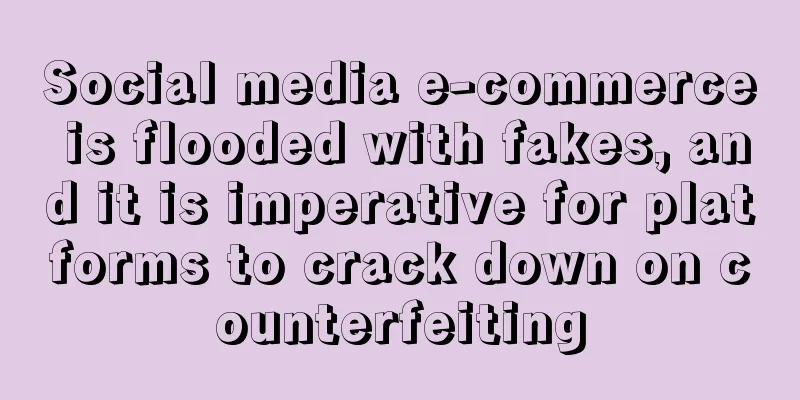Social media e-commerce is flooded with fakes, and it is imperative for platforms to crack down on counterfeiting

|
The UK Intellectual Property Office (UKIPO) recently surveyed 1,000 female consumers to measure the situation of counterfeit products in the social media e-commerce market and determine the influence of influencers on social media platforms in promoting the sale of counterfeit products .
The UKIPO found in its survey that 17% of respondents ( 70% aged between 16 and 33) had purchased counterfeit products in the past year , and 13.3% of respondents said that they were influenced by bloggers on social media platforms to buy counterfeit products .
In other words, 13.3% of respondents deliberately purchased counterfeit products at the behest of social media influencers. The UKIPO believes that influencers are a noteworthy force in promoting counterfeit products and an important channel for counterfeit suppliers to enter the market.
According to a previous report by the UKIPO , fashion clothing and accessories are an important market where counterfeits are rampant . Such products are particularly attractive to young consumers, with 20% of respondents saying they had purchased pirated clothing or accessories in the past year , compared to 4% for older consumers .
The UKIPO report also mentioned that in addition to the two categories of fashion clothing and accessories , the jewelry , watches and beauty products markets are also flooded with pirated products .
Interesting findings from the UKIPO survey are that 18% of respondents believe that counterfeit products do not harm businesses and jobs, 22% believe that counterfeit products do not pose a threat to their health and safety, and 33% say that the prevalence of counterfeits is due to brands pricing their products too high.
In fact, there is already a lot of content involving counterfeit goods on Google , YouTube , and social media sites such as Instagram and TikTok . Browsing YouTube, you will find that many videos posted by content creators dominated by young women promote counterfeit clothing, accessories and beauty products to subscribers .
Where there is counterfeiting, there must be anti-counterfeiting. Brands and market platforms are joining forces to crack down on the sale of counterfeit goods by influencers.
Amazon sued social media influencers Kelly Fitzpatrick and Sabrina Kelly in November 2020 Krejci conspired with sellers on the Amazon marketplace to promote counterfeit luxury goods on the Instagram platform .
Facebook also cooperated with Gucci in April 2021 to file a lawsuit against an influencer named Natalia Kokhtenko . The influencer used the Facebook and Instagram platforms to sell counterfeit luxury brand goods, violating trademark law and the terms and policies of the Facebook and Instagram platforms .
In general, platform anti-counterfeiting is an important means to protect property rights and maintain market order. However, anti-counterfeiting is also a long process. To create a healthy market environment, it still requires the joint efforts of the platform, platform merchants and consumers. Social e-commerce policy operations Amazon Platform |
<<: Cross-border transactions will reach $156 trillion in 2022! Free shipping is awesome...
>>: Domestic children's trucks recalled due to lead poisoning risk
Recommend
What is andersondesigngroupstore? andersondesigngroupstore Review, Features
andersondesigngroupstore initially focused on CD p...
China formally applies to join CPTPP trade pact
On September 16, China's Ministry of Commerce...
In the seventh month of going overseas, Fan Bingbing's beauty brand is selling like hot cakes in Southeast Asia!
On the evening of December 20, Fan Bingbing's...
What is Saleku? Saleku Review, Features
The core team of Saleku has more than ten years of...
What is Jinghuitong? Jinghuitong Review, Features
Jinghuitong (Shanghai Jinghui Information Technol...
Could this be the trigger for the store closure? Amazon strikes hard at the top fake order companies
Last year, Amazon closed its stores due to a mass...
What is uPrimer? uPrimer Review, Features
uPrimer is a product of Huifu International, prov...
What is ECPSS? ECPSS Review, Features
Huichao Payment Co., Ltd. is a third-party payment...
What is Weighted Idea? Weighted Idea Review, Features
Weighted Idea specializes in manufacturing and se...
Lazada continues to increase investment after achieving profitability, connecting merchants to 9 major markets in one stop
On August 29, the reporter learned from the Lazad...
After switching to cross-border business, she became the leader in the category in 4 years!
As the saying goes, the waves behind push the wav...
What is Shopswain? Shopswain Review, Features
Shopswain is a tool that helps Amazon sellers gro...
What is Tuowei Tianhai? Tuowei Tianhai Review, Features
Tuowei Tianhai (Guangzhou Tuowei Tianhai Internati...
Good news! Amazon launches new order processing capabilities
With the rapid development of e-commerce, consume...
What is Leke Business School? Leke Business School Review, Features
Leke Business School is a professional company fo...









